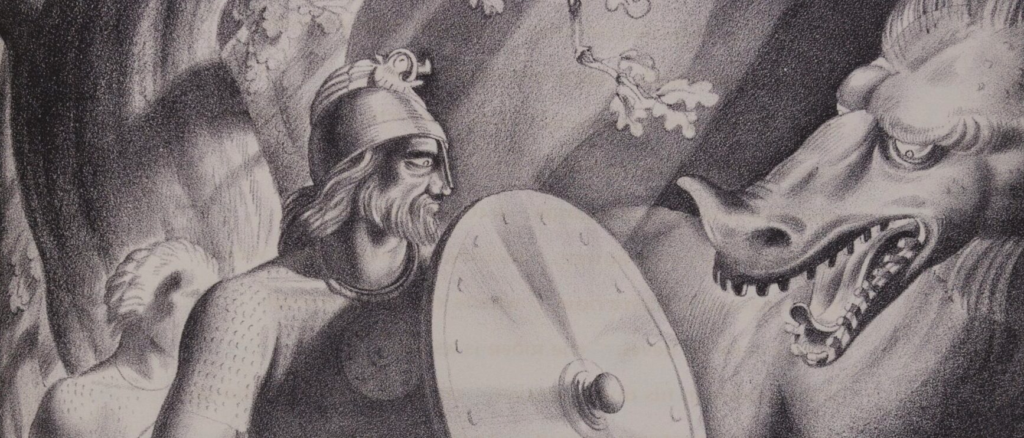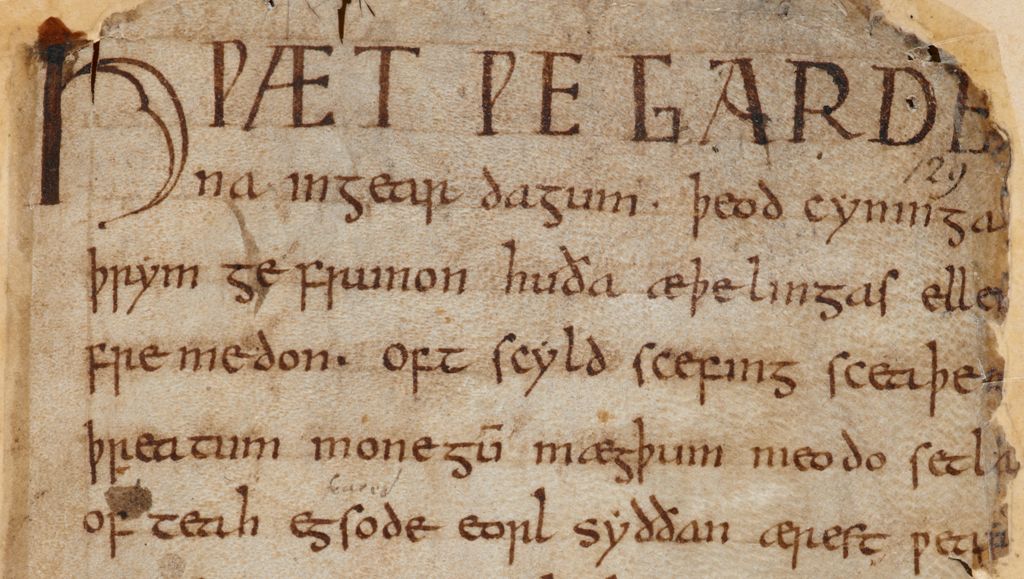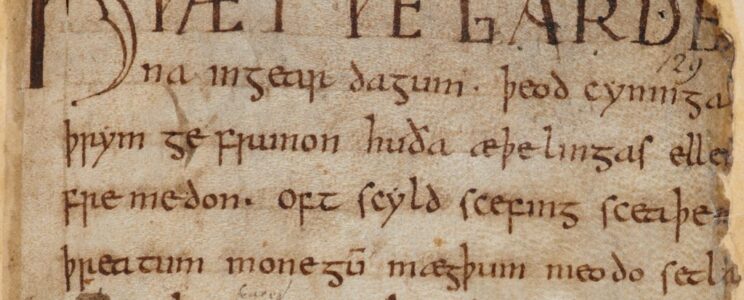Beowulf, an Old English epic poem, stands as one of the most significant works in Anglo-Saxon literature. Composed sometime between the 8th and early 11th century, this narrative has not only provided profound insights into the culture and values of the time but has also exerted a lasting influence on modern literature. The epic’s themes of heroism, loyalty, and the struggle between good and evil continue to resonate with contemporary audiences and writers. This article explores the enduring legacy of Beowulf and its impact on modern literature, tracing its influence through various genres and works.
The Narrative and Themes of Beowulf
Beowulf narrates the heroic deeds of its eponymous protagonist, who battles the monstrous Grendel, Grendel’s vengeful mother, and, in his final act, a dragon. The poem delves deep into themes of heroism, the fleeting nature of life, and the importance of legacy and reputation. These themes are universal and timeless, allowing Beowulf to transcend its historical context and remain relevant in modern storytelling.
The structure of Beowulf, with its emphasis on the hero’s journey, has laid the groundwork for many narratives in modern literature. The hero’s journey, a concept popularized by Joseph Campbell in the 20th century, finds one of its earliest and most compelling examples in Beowulf. This narrative framework, which involves a hero embarking on an adventure, facing and overcoming a crisis, and returning transformed, is a staple in modern storytelling, from classic literature to contemporary films.
Beowulf’s Influence on Modern Fantasy Literature
The fantasy genre, in particular, owes a significant debt to Beowulf. J.R.R. Tolkien, one of the most influential figures in modern fantasy, was profoundly impacted by the epic. In his essay “Beowulf: The Monsters and the Critics,” Tolkien argued that Beowulf should be appreciated for its literary qualities rather than merely as a historical document. His deep appreciation and scholarly work on Beowulf are evident in his own writings. The influence of Beowulf is unmistakable in Tolkien’s works, especially in “The Hobbit” and “The Lord of the Rings” series.
In “The Hobbit,” the dragon Smaug bears a striking resemblance to the dragon in Beowulf. Both dragons hoard treasure and pose a significant threat to their respective worlds. The thematic exploration of heroism and the moral complexities of facing such a creature are mirrored in Tolkien’s narrative. Similarly, the world-building in “The Lord of the Rings,” with its rich mythology and emphasis on heroism and valor, echoes the epic grandeur of Beowulf.
Other fantasy authors, such as Neil Gaiman, have also drawn inspiration from Beowulf. Gaiman’s novel “American Gods” features a protagonist whose journey and encounters with mythological beings reflect the epic’s themes. Gaiman also co-wrote the screenplay for the 2007 film adaptation of Beowulf, bringing the ancient tale to a new generation of audiences.

Beowulf and Modern Heroic Narratives
Beyond fantasy, Beowulf’s impact can be seen in modern heroic narratives across various genres. The structure and themes of the epic have influenced superhero comics and films, where the hero’s journey and the battle between good and evil are central elements. Characters like Superman, Batman, and Wonder Woman can trace their heroic lineage back to Beowulf, as they embody the timeless qualities of bravery, sacrifice, and a commitment to justice.
In literature, authors like Michael Crichton have reimagined the Beowulf legend in contemporary settings. Crichton’s novel “Eaters of the Dead,” later adapted into the film “The 13th Warrior,” combines historical fiction with the Beowulf narrative. The novel tells the story of a 10th-century Muslim traveler who encounters a group of Norse warriors and joins them in their battle against a mysterious and deadly foe. The story parallels Beowulf’s fight against Grendel, showcasing how the epic’s themes can be adapted to different contexts and cultures.
Beowulf in Modern Poetry and Literature
Modern poets and authors have also found inspiration in Beowulf, often drawing on its themes and language to create new works. Seamus Heaney’s acclaimed translation of Beowulf, published in 1999, brought the epic to a wider audience and highlighted its poetic beauty and narrative power. Heaney’s translation captures the rhythmic and alliterative qualities of the original Old English, making it accessible to contemporary readers while preserving its ancient essence.
The influence of Beowulf extends to contemporary fiction as well. Authors like John Gardner have explored the epic’s themes from new perspectives. Gardner’s novel “Grendel,” published in 1971, retells the story from the perspective of the monster Grendel, offering a complex and nuanced view of the character traditionally seen as the villain. This novel challenges readers to reconsider the notions of heroism and monstrosity, highlighting the multifaceted nature of the original epic.
The Enduring Appeal of Beowulf’s Themes
One reason for Beowulf’s lasting impact is its exploration of universal themes that continue to resonate with modern readers and writers. The epic grapples with the nature of heroism, the inevitability of death, and the importance of legacy—topics that are as relevant today as they were in the early medieval period. The hero’s journey, as depicted in Beowulf, provides a framework for storytelling that appeals to a broad audience, offering a narrative structure that is both familiar and compelling.
Moreover, Beowulf’s exploration of the human condition—its triumphs, struggles, and the quest for meaning—transcends cultural and temporal boundaries. This timeless quality ensures that the epic remains a source of inspiration and reflection for modern writers, who continue to draw on its themes and narrative techniques to create new works that speak to contemporary issues and experiences.
Beowulf in Popular Culture
Beowulf’s influence extends beyond literature into various forms of popular culture, including film, television, and video games. The 2007 film adaptation, directed by Robert Zemeckis and featuring a screenplay by Neil Gaiman and Roger Avary, brought the epic to a new audience with its blend of traditional storytelling and cutting-edge technology. The film’s visual representation of the epic’s characters and settings highlighted the enduring appeal of Beowulf’s narrative.
Video games have also drawn inspiration from Beowulf, incorporating elements of the epic into their storylines and character development. Games like “The Elder Scrolls V: Skyrim” feature dragon battles and heroic quests that echo the themes of Beowulf. These modern reinterpretations of the epic allow players to engage with the narrative in interactive and immersive ways, demonstrating the versatility and enduring relevance of Beowulf’s themes in contemporary storytelling.
Literature Inspired by Beowulf: A Journey Through Modern Narratives
Beowulf, one of the most celebrated works of Old English literature, has had a profound and lasting influence on modern literature. Its themes of heroism, loyalty, and the eternal struggle between good and evil have inspired countless writers, leading to the creation of numerous works that echo, reinterpret, or directly reference this ancient epic. This article explores a selection of modern literature that has been inspired by Beowulf, showcasing the epic’s enduring legacy and its impact on contemporary storytelling.
J.R.R. Tolkien: The Father of Modern Fantasy
J.R.R. Tolkien, a philologist and professor, is perhaps the most notable author influenced by Beowulf. His extensive study of the epic is evident in his own legendary works, such as “The Hobbit” and “The Lord of the Rings.”
In “The Hobbit,” the dragon Smaug is a clear homage to the dragon in Beowulf. Both dragons hoard treasure and pose significant threats to their respective worlds. The thematic parallels between Bilbo Baggins’ reluctant heroism and Beowulf’s valor highlight Tolkien’s deep engagement with the epic. Moreover, the battle against Smaug mirrors Beowulf’s climactic fight against the dragon, showcasing themes of bravery and the hero’s journey.
“The Lord of the Rings” also reflects Beowulf’s influence. The epic’s exploration of heroism, the fleeting nature of life, and the significance of legacy are central themes in Tolkien’s trilogy. Characters such as Aragorn and Frodo Baggins embody the heroic qualities admired in Beowulf, undertaking perilous quests that test their courage and resolve.

John Gardner: A New Perspective on the Monster
John Gardner’s novel “Grendel” (1971) offers a unique and compelling reinterpretation of Beowulf from the perspective of the monster. By giving voice to Grendel, Gardner humanizes the creature traditionally depicted as a villain, exploring themes of isolation, existential angst, and the search for meaning in a chaotic world.
“Grendel” delves into the psychological and philosophical dimensions of the character, presenting him as an intelligent and introspective being struggling with his identity and purpose. This novel challenges readers to reconsider the simplistic dichotomy of hero and monster, offering a nuanced exploration of morality and the human condition.
Michael Crichton: A Historical Reimagining
Michael Crichton’s novel “Eaters of the Dead” (1976) reimagines the Beowulf legend through the lens of historical fiction. The story is presented as a manuscript written by Ahmad ibn Fadlan, a 10th-century Arab traveler who encounters a group of Norse warriors. These warriors, led by a character reminiscent of Beowulf, battle a mysterious and deadly enemy that threatens their community.
Crichton’s novel blends elements of historical narrative and the epic’s mythic structure, creating a compelling and adventurous tale. The adaptation of the Beowulf story into a different cultural and historical context highlights the epic’s versatility and its capacity to inspire diverse narratives.
Seamus Heaney: A Poetic Tribute
Seamus Heaney’s translation of Beowulf, published in 1999, is a masterful work that brought the epic to a wider contemporary audience. Heaney’s translation captures the poetic beauty and rhythmic qualities of the original Old English, making it accessible while preserving its ancient essence.
Heaney’s Beowulf is noted for its vivid imagery and lyrical power, offering readers a fresh and engaging interpretation of the epic. His translation has been praised for its ability to convey the emotional depth and narrative complexity of Beowulf, demonstrating the enduring appeal of the poem’s themes and its relevance to modern readers.
Neil Gaiman: Myth and Modernity
Neil Gaiman, a prolific writer known for his work in fantasy and mythological fiction, has also drawn inspiration from Beowulf. His novel “American Gods” (2001) features mythological elements and themes that echo the epic’s exploration of heroism and the supernatural.
Gaiman’s interest in Beowulf is further evident in his co-writing of the screenplay for the 2007 film adaptation of Beowulf. This adaptation brought the ancient tale to life with modern cinematic techniques, introducing the epic to a new generation of viewers. Gaiman’s work often blurs the lines between ancient myths and contemporary narratives, showcasing the timeless nature of Beowulf’s themes.
Maria Dahvana Headley: A Modern Retelling
Maria Dahvana Headley’s novel “The Mere Wife” (2018) is a contemporary retelling of Beowulf set in a suburban American neighborhood. The story reimagines the characters and conflicts of the epic in a modern context, exploring themes of identity, motherhood, and societal expectations.
In “The Mere Wife,” the character of Grendel becomes Gren, a misunderstood boy raised by his fiercely protective mother, Dana. The novel examines the tensions between the residents of the suburban community and the outsiders they perceive as threats, reflecting the timeless themes of fear, otherness, and the struggle for understanding.
Video Games: Interactive Storytelling
The influence of Beowulf extends beyond literature into the realm of video games, where its themes and narrative structure have inspired interactive storytelling. Games like “The Elder Scrolls V: Skyrim” incorporate elements reminiscent of Beowulf, such as dragon battles and heroic quests.
These modern reinterpretations allow players to engage with the epic’s narrative in immersive ways, experiencing the hero’s journey firsthand. The enduring appeal of Beowulf’s themes is evident in the popularity of such games, which continue to captivate and inspire players with their rich, mythic storytelling.
Conclusion: Beowulf’s Lasting Legacy
Beowulf’s impact on modern literature and culture is profound and far-reaching. Its themes of heroism, the struggle between good and evil, and the quest for legacy and meaning continue to inspire writers and creators across various genres and media. From the fantasy worlds of Tolkien and Gaiman to the heroic narratives of comic books and films, Beowulf’s influence is evident in countless modern works.
The epic’s enduring appeal lies in its exploration of universal themes and its ability to resonate with audiences across different cultures and time periods. As a foundational text in the canon of Western literature, Beowulf provides a rich source of inspiration for modern storytellers, offering a timeless narrative framework that continues to captivate and inspire.
In an age where literature and media constantly evolve, Beowulf remains a touchstone for understanding the power of storytelling and the enduring nature of human experience. Its legacy lives on in the countless works it has inspired, reminding us of the timeless nature of heroism, the complexities of the human condition, and the enduring power of narrative to shape our understanding of the world.


